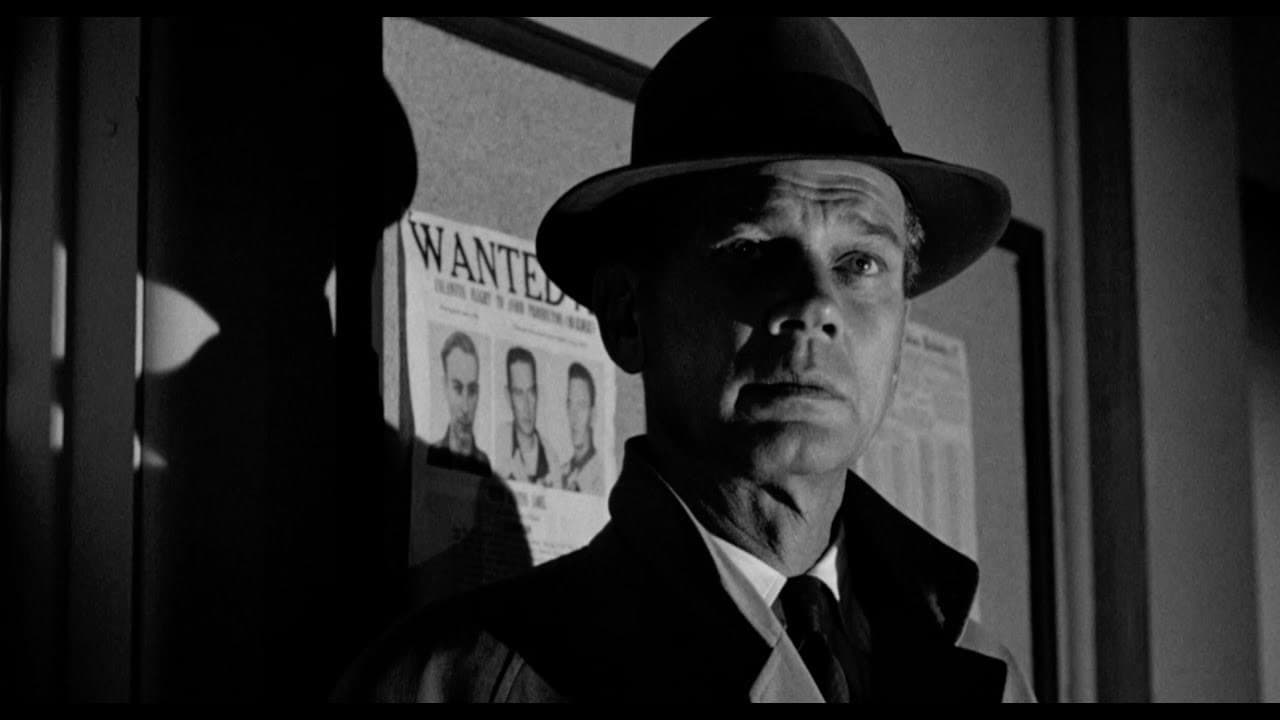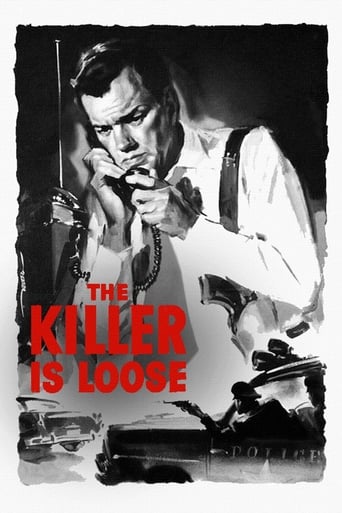

A brilliant film that helped define a genre
... View MoreIt's not great by any means, but it's a pretty good movie that didn't leave me filled with regret for investing time in it.
... View MoreEasily the biggest piece of Right wing non sense propaganda I ever saw.
... View MoreI enjoyed watching this film and would recommend other to give it a try , (as I am) but this movie, although enjoyable to watch due to the better than average acting fails to add anything new to its storyline that is all too familiar to these types of movies.
... View MoreAre you kidding me? Wendell Corey usually played the boring, uptight second lead in his film roles so his character in this little "B" noir is a huge surprise. I never thought he was much of an actor but he really lets loose here as the bank clerk who goes off the rails and comes out killing everyone in sight. He is out for revenge on Joseph Cotten who sent him up the river for his participation as the "inside man" in a bank heist which resulted in Corey's wife being killed accidentally. After his escape from an Honor Farm where he was serving the remainder of his sentence, he starts stalking Cotten and his wife (Rhonda Fleming) with a few incidental murders along the way. The film ends as you would expect......it's not a complicated film but is somehow believable. A great addition to your noir library.
... View MoreRespected western auteur Budd Boetticher is woefully out of place with this choppy modern day cops and robbers story that suffers from a strong lack of emotional believability. Boetticher seems to have waived rehearsal time and settled for the first take as leads Joe Cotton and Rhonda Fleming put little effort into their roles, delivering lines flatly and without energy. Mild mannered employee Leon "Foggy" Poole works as an inside man on a bank job that goes bad and gets his wife killed in the process. He escapes from prison and immediately sets out to kill the wife of the detective who killed his. Hundreds of cops are mobilized to keep him from getting to the home of the intended who has been moved to another location but wouldn't you know in the films final moments we have Foggy trailing feet behind the victim (who thought somehow that taking a bus back to the house was a sound move) while a company of cops observe and bicker over what action to take. Sound preposterous? You should see it. It's all of that and more. Lucien Ballard's camera work does a decent job of bringing noir to the suburbs but the editing is lackadaisical and shapeless and it drains the film of its suspense and pace. As Poole, Wendell Corey is the best thing in the film managing to evoke great sympathy as he transitions from gentle soul to murderer. These attributes aside Killer uniformly fails in construction and execution making its message clear. Go Western old Budd.
... View MoreThat's not a rip on Joseph Cotten, who solid as a mildly henpecked cop whose wife's primary nag is to ask him to quit police work. But after the end of the movie, I didn't remember the last name of Cotten's character (Wagner). Or the name of his regrettably still living wife (who cares?) at all. What I remembered was Leon "Foggy" Poole.First, to correct something I saw in a couple other comments, the cops did not kill Mrs. Poole through the door. After Leon calls out the cliché "you're not gonna take me" and shoots from the apartment wounding an officer, the cops then break in guns firing.. but it's Mrs. Poole in the middle of the room while Leon is over in a corner. If the police had taken a split second to look where they were shooting, they would have gotten the right person. Which is what sends Leon over the edge But Corey as Poole is, even as a killer, a sympathetic character. In the apartment after the shooting he seems more dazed than crazed as he asks Wagner "Don't you see how wrong it was to do that?" The movie then jumps to Poole's trial, where he gives the calmest revenge threat I've ever seen. This IMHO is what makes Poole so memorable... he's so matter-of-fact about what he's doing. No hysterics or foaming at the mouth. At Otto's house when Otto's wife asks why Poole had to come there, he replies, "I had to come somewhere" as if holding your former sergeant's wife at gunpoint after breaking out of jail and killing 2 people happened every day.Later on after killing Otto he asks the room at large, "what else could I do?" after Otto essentially talked himself into getting shot by reminding Poole how much stronger/faster/fresher he was. By trying to talk Poole into giving up, Otto instead ensured his own death... A great bit of irony.This movie's only real weakness is that that Rhonda Fleming lives through it. Some movies would simply be better if the villain had won, and this is one of them. The idea that Poole, who had doubtless been fixating on Wagner's wife throughout his trial, wouldn't recognize her when she walks by him on her way home is ridiculous. The only explanation for this is that at this time (1956), production codes would not allow the criminal to get away with it. However, they could have at least had Poole kill the wife then get gunned by Wagner. Then maybe a dying Poole could tell Wagner, holding the body of his wife, something like "now you know". Instead, after a great 70 or so minutes, the so-called climax left me going "oh please" followed by "that's it?"But the first 65+ minutes of this movie more than make up for the last 5. If you get a chance to see this movie, do it, and just rewrite the ending in your head :)
... View MoreGood touch when pots and pans clang to the floor after the John Larch character gets blown away by an unblinking "Foggy" Poole (Corey). Old Foggy may not be much in the charm department, but behind that deadpan stare lurks an iron will that won't be deterred. Corey's offbeat impersonation is one of the more memorable villains of the period, foreshadowing the complex bad guys of director Boetticher's celebrated Ranown Westerns. Cop Joseph Cotton doesn't realize that old Foggy is too addled to distinguish between intention and accident. Poole only knows that his one emotional link to the world, his beloved wife, has been killed by the cop, and by golly it's an eye-for-an-eye. And when he speaks lovingly of his need for her, the one person in his life who's treated this bespectacled weirdo with respect, he's humanized in ways that screenplays seldom bother with. As an actor, Corey was known for an exceptionally cold demeanor, but when his cold-blooded killer speaks those lines from behind the coke- bottle glasses, an unexpected pathos emerges. It's a first-rate performance, such that were the Oscars not so prejudiced against low-budgeters like Killer, Corey would have been considered for a presentation.The Foggy role is clearly the best thing the movie, which otherwise is pretty much standard thriller fare. There's an obvious effort at building up Fleming's role as the cop's wife. After all, she was a glamour star at the time (note the eye-catching tops she sports). And working her somehow into the woman-in-danger finale is pretty predictable. Nonetheless, Boetticher puts it all together in compelling fashion, including the persuasive LA locations, especially the freeway roadblock. The tie-up looks real, but if it was, I wonder who pacified the long lines of stuck motorists. Also, army guys who've suffered under an arrogant non-com like Larch's probably get some perverse satisfaction out of seeing a sadsack like Foggy finally blow his tormentor away. I suspect this was an instance of writer's revenge. Anyhow, despite the many clichés, there are a number of nice touches, but most of all, there's the truly offbeat approach to the whole idea of 50's movie villains.
... View More